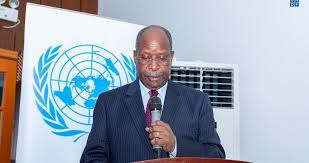
The United Nations Special Representative of the Secretary-General has voiced concerns regarding Niger’s choice to withdraw from the Multinational Joint Task Force (MNTJF), which is engaged in combating armed Islamist groups in West Africa.
During the Lake Chad Basin Governors’ Forum held in Maiduguri, Nigeria, participants highlighted the necessity of sustaining diplomatic initiatives and financial backing for the task force.
Santos Simão pointed out that the MNTJF is currently the sole operational security mechanism in the area.
This coalition, which includes Benin, Cameroon, Chad, and Nigeria, is tasked with addressing the Boko Haram insurgency.
“Despite ongoing efforts to uphold the integrity of this coalition, Niger has recently declared its intention to withdraw from the task force. This decision arises at a time when security remains a paramount concern for the region,” he stated.
In his report on the regional situation, Santos Simão noted that while socio-economic conditions are improving, security remains critical for achieving stability.
Sierra Leone’s permanent representative to the United Nations, Michael Imran Kanu, echoed this sentiment, remarking that the “evolving security landscape has been characterized by increasing geopolitical tensions.”
He further stated that the emphasis should be on enhancing regional security mechanisms that are rooted in national ownership and foster cooperation among ECOWAS, the African Union, neighboring nations, and other subregional initiatives. Kanu concluded that the stability of West Africa and the Sahel “must reflect collaborative strategies aligned with the priorities of its people.”
Sierra Leone serves as a non-permanent member of the Security Council and is also part of UNOWAS.

Santos Simão noted that the socio-economic indicators in the region show promise and have seen improvements, largely driven by resource extraction and food production.
However, he pointed out that ongoing issues such as high inflation, rising debt, climate-related shocks, and limited fiscal flexibility continue to hinder the government’s capacity to invest in essential services and infrastructure.
In light of these persistent challenges, UNOWAS emphasized the need for comprehensive strategies and partnerships that focus on macroeconomic stability, inclusive growth, and enhanced economic governance to bolster long-term resilience in the region.



